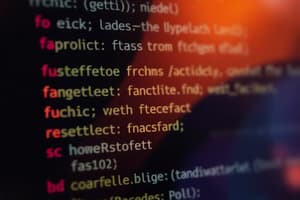Podcast
Questions and Answers
What is a function in C programming?
What is a function in C programming?
A block of code used to perform a specific task.
Which of the following is an example of a standard library function in C?
Which of the following is an example of a standard library function in C?
- myCustomFunction()
- add()
- printf() (correct)
- myFunction()
Every C program must have a function named main().
Every C program must have a function named main().
True (A)
What does the returnType in a function definition signify?
What does the returnType in a function definition signify?
A function call must match the number and data type of parameters from the function's ______.
A function call must match the number and data type of parameters from the function's ______.
What is the syntax for defining a function in C that returns a value?
What is the syntax for defining a function in C that returns a value?
What are macros in C programming?
What are macros in C programming?
Performance-wise, macros are generally slower than functions.
Performance-wise, macros are generally slower than functions.
The function body includes all statements to be executed whenever a function ______ is made.
The function body includes all statements to be executed whenever a function ______ is made.
Match the following function types with their descriptions:
Match the following function types with their descriptions:
Flashcards are hidden until you start studying
Study Notes
Functions in C Programming
- A function is a block of code that performs a specific task.
- Every C program must have at least one function, the
main()function. - Functions can call other functions, and themselves (recursion).
- Functions improve code reusability and readability.
- Functions allow large programs to be broken into smaller modules.
- Functions can be called any number of times.
Types of Functions
- Standard Library Functions: Built-in functions provided by the C library.
- Examples:
printf(),scanf(),pow(),sqrt(), etc. - Declared in header files (e.g.,
stdio.h,math.h).
- Examples:
- User-Defined Functions: Functions created by the programmer.
Function Components
- Function Declaration (Prototype): Informs the compiler about the function's name, return type, and parameters.
- Syntax:
returnType functionName (parameterList); - Example:
int sum(int, int);
- Syntax:
- Function Definition: Contains the code that performs the function's task.
- Syntax:
returnType functionName (parameterList) { body of the function }
- Syntax:
- Function Call: Executes the function's code.
- The function name must match exactly the name in the prototype and definition.
- The number and data types of parameters passed must match the definition.
- If the function returns a value, it must be assigned to a variable of the same data type.
Function Return Types
void: Indicates the function does not return a value.- Data Type: Function returns a value of that type (e.g.,
int,float,char).
Function Parameter List
- Formal Parameters: Variables declared in the function definition that receive values from the function call.
- Actual Parameters: Values passed to the function during the function call.
Function Types Based on Data Flow
- Accepting Parameters and Returning a Value: Typical function.
- Accepting Parameters and Not Returning a Value: Performs a task without returning a specific value.
- Not Accepting Parameters and Returning a Value: Performs a task and provides a result.
- Not Accepting Parameters and Not Returning a Value: Performs a task without providing a result.
Functions vs. Macros
- Macros:
- Processed by the preprocessor, not compiled.
- No type checking.
- Faster execution.
- Useful for small code snippets that are used frequently.
- Do not check for errors during compilation.
- Functions:
- Compiled by the compiler.
- Type checking is performed.
- Slower execution.
- Useful for larger blocks of code that are used repeatedly.
- Compile-time errors are detected.
- Safer than macros due to type checking.
Macro Example
#define COLLEGE printf("*****SENECA COLLEGE*****")
#define CUBE(x) x*x*x
Conclusion
Functions provide structure and reusability in C programming. They are crucial for developing modular, organized, and efficient code. Understanding the types and components of functions enables you to write effective and maintainable C programs.
Studying That Suits You
Use AI to generate personalized quizzes and flashcards to suit your learning preferences.





